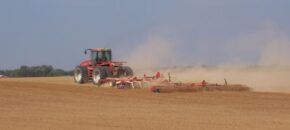It is extremely important to know which pathogen is causing damping-off problems and which fungicide to properly apply. The key to controlling damping-off is being proactive instead of reactive. Always refer to the fungicide label for crop use, pathogens controlled, and application rates. Damping-off is caused by a number of important vegetable pathogens and is […]
Continue reading...Damping-off: Identifying and Controlling Pathogens in Transplant Production in 2022
EPA Releases Testing Data Showing PFAS Contamination from Fluorinated Containers
[U.S. EPA Office of Chemical Safety and Pollution Prevention sent this bulletin at 03/05/2021 01:58 PM EST] Note: This EPA OPP Update has been forwarded to all New Jersey Mosquito Control Agencies. As the U.S. Environm… Read More »
Continue reading...IPM vs. PHC: Is There a Difference?

History During the late 1950’s and early 1960’s, Integrated Pest Management (IPM) was an approach to field crop management that farmers increasingly began to practice in the United States. It took barely a decade for farm agriculture to fully realize the problems associated with the over-reliance on pesticides when controlling pests. The classic example of […]
Continue reading...Value-Added Producer Grants in New Jersey
Grant.gov applications are due by April 29, 2021 and paper applications must be postmarked by May 4, 2021 The Value-Added Producer Grant (VAPG) program administered by the USDA’s Rural Development Agency (RD), helps agricultural producers enter into value-added activities related to the processing and marketing of new products. The goals of this program are to […]
Continue reading...Assistance Needed: Sweet Corn Bird Damage Survey

This applies to all sweet corn producers. Researchers at the University of Rhode Island are currently distributing an online survey about fresh market sweet corn. If you grow fresh market sweet corn you are eligible to take this short 5-minute online survey. Your participation and feedback are extremely valuable to the success of this research. […]
Continue reading...Covid Update From Secretary of Agriculture
March 5, 2021 COVID-19 Vaccine Update Dear Farm Owner/Operator: On March 1, 2021 Governor Murphy announced that farmworkers will be eligible for the COVID-19 vaccine starting March 15, 2021. We understand that the ag community is anxious to have everyone on their farm vaccinated as soon as possible, especially since some of you already […]
Continue reading...